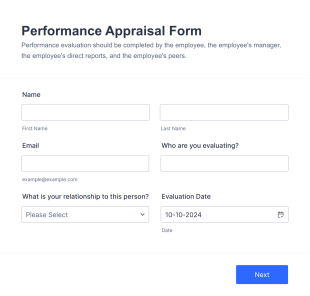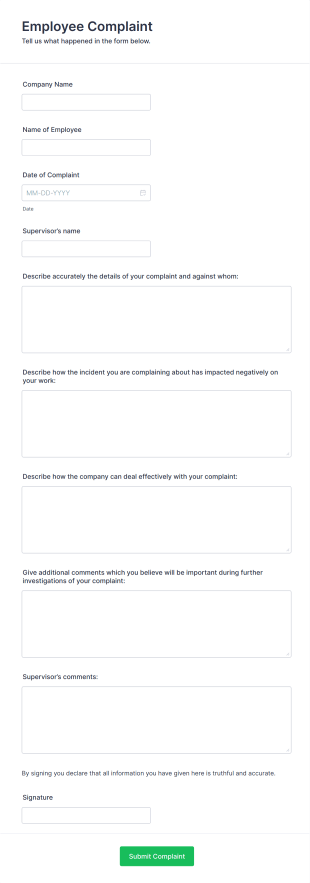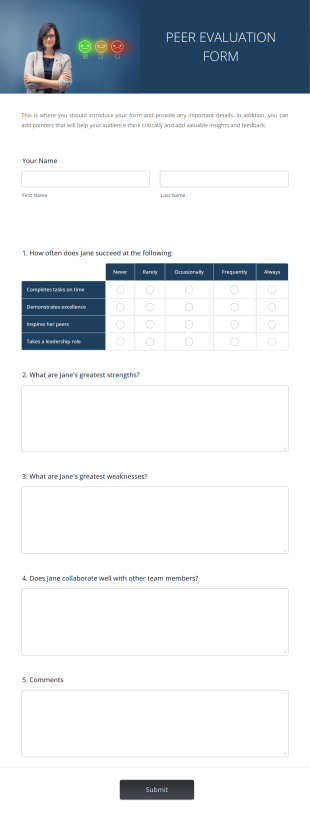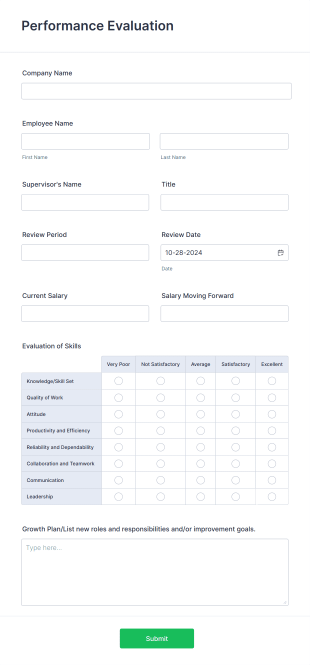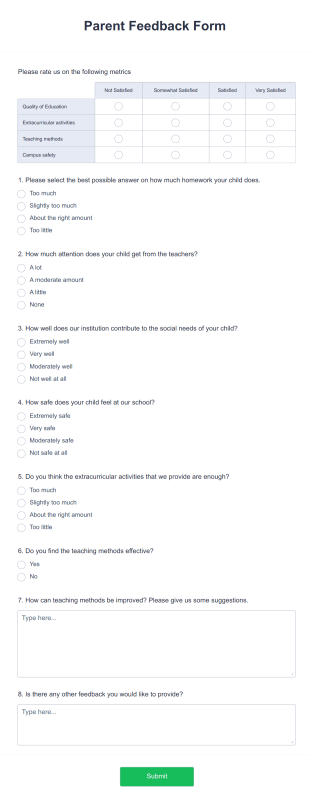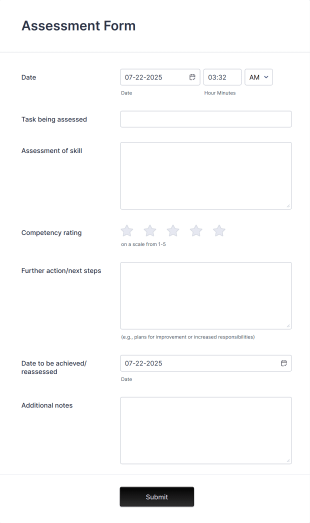Employee Evaluation Forms
About Employee Evaluation Forms
An employee evaluation form is a performance review tool used to track employee progress by collecting information about employees’ skills, goals, and accomplishments. With our free Employee Evaluation Form templates, you can collect responses online to easily see what your employees are doing well and identify areas for improvement. Once you’ve conducted your employee reviews through your computer or mobile device, they’ll be securely stored in your Jotform account — making it easy to manage reviews and convert them into printable PDFs!
To conduct valuable employee evaluations for your company or HR department, you’ll need a great employee evaluation form template. Start with one of our ready-made Employee Evaluation Form templates and customize it with Jotform Form Builder to create the perfect evaluation form for your needs. Rearrange the template layout, add and update questions, upload your company logo, and more — you can even make the form more visually engaging with matrix tables and rating scales! Monitor employee progress online with our free Employee Evaluation Forms to decrease paperwork and conduct more efficient performance reviews.
Frequently Asked Questions
1) Why are employee evaluation forms important?
Employee evaluation forms are important tools for businesses in a variety of ways. First, they drive performance improvement by providing a structured way to assess and measure an employee's strengths and weaknesses. They also help to pinpoint areas for performance improvement through constructive feedback from managers and executives.
On the flip side, these forms allow employees to set attainable goals and performance expectations. They also serve as a way for employees to document their achievements and improvements, which can be valuable when advocating for promotions. Finally, employee evaluation forms can provide legal protection for both the company and the employee by establishing a paper trail of performance.
2) What are the key components of powerful employee evaluation forms?
Effective employee evaluation forms typically include identifying information about the employee, including name, position, department, evaluation period, team, etc. They then list the employee’s goals, objectives, or performance indicators, along with a way to rate their performance on each.
Generally, the employee evaluation form includes sections for feedback and written comments from both the employee and the manager to expand on the employee’s strengths and areas for improvement. This can be followed by a development plan that lists steps for growth.
3) What are the subtypes of employee evaluation forms?
Employee evaluation forms can be used in every industry and across every level of an organization. One of the most commonly known types of employee evaluations is the annual performance review, which is conducted once a year to assess an individual’s overall performance and progress. This may include 360-degree feedback, which uses peer input for a more comprehensive assessment, or a project-based evaluation, which evaluates performance related to a specific project or task. There are also sales performance reviews that are designed to assess sales growth with sales team members.
Another kind of employee evaluation is a probationary review, which monitors new employees or those who have been put in a probationary period. Finally, there are self-evaluations, which allow employees to assess their own performance before discussing it with their managers.
4) What are the best practices for administering employee evaluation forms?
To get the most out of your employee evaluation forms, you should keep the following practices in mind:
- Conduct them at regular intervals : Establish predetermined intervals for employee evaluation to allow employees to prepare themselves and create consistency.
- Focus on open communication : Encourage open dialogue during evaluation meetings to establish trust between managers and employees.
- Train managers : Train your managers on how to properly evaluate employees, give constructive feedback, and help them set achievable goals.
- Document the evaluation process : Keep detailed records of evaluations and discussions for future reference.
- Use consistent evaluation criteria : Create uniform processes that are used with all employees to promote fairness.
5) What are the benefits of employee evaluation forms?
Employee evaluation forms offer a host of potential benefits — most notably improved employee performance. These forms can help managers identify areas for employee improvement and create plans to help them achieve these goals. In turn, this information can guide professional development and motivate employees to excel through continuous recognition. They also encourage regular, constructive conversations between employees and managers that can improve working relationships.
Employee evaluation forms can also provide important data to help HR departments make decisions about promotions, raises, or terminations and provide protection against unfounded legal claims about employee treatment.

